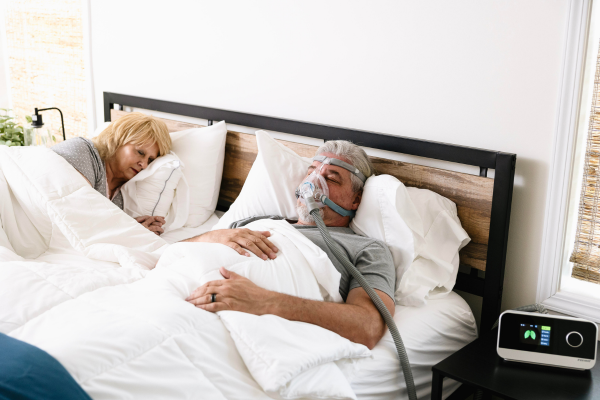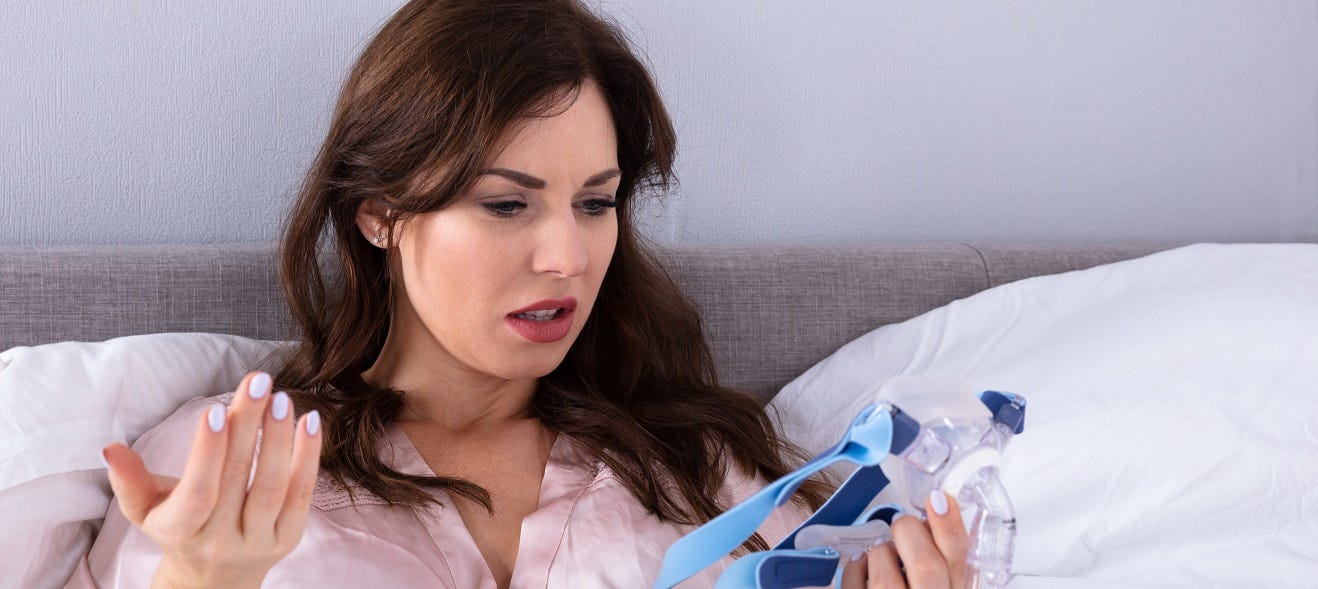After being diagnosed with sleep apnea, it’s natural to wonder if it’s a lifelong (and life-threatening) condition. You may ask yourself questions like… Does it ever go away? Can you cure it? What if I lose weight? Generally speaking, sleep apnea is considered a chronic health condition, so it’s here for the long haul. Yet, with certain treatment options, it may be possible for some to reduce, or permanently eliminate, their sleep apnea symptoms. Today, we’ll explore if a sleep apnea diagnosis ever goes away, whether you’re treating it or not.
IN THIS ARTICLE:
What Are Common Causes Of Obstructive Sleep Apnea?
Is There A Cure For Sleep Apnea Without Using CPAP?
Can You Live A Long Life With Sleep Apnea?
CPAP SUPPLIES THROUGH INSURANCE:
Aeroflow Sleep is in-network with most primary insurance companies and is accreditted by Medicare and Medicaid. Complete our Qualify Through Insurance Form, and we will automatically check to see if your plan covers CPAP supplies; including a machine, mask, and accessories. ***Must have a sleep study to qualify.***
You will also receive the care and attention every sleep apnea patient deserves; one-on-one clinical support in-home or via telehealth, a dedicated Sleep Specialist you can contact during business hours, and a user-friendly online portal with tailored replacement schedule, important updates and notifications, and educational resources.
Let us take the headache out of healthcare. Join the Aeroflow Sleep family today! It only takes 5-7 minutes to get started.
A Brief Intro To Sleep Apnea
To understand if sleep apnea can be cured, we first need to understand what causes OSA, CSA, or mixed sleep apnea. The underlying cause of your sleep disorder (and which one you have) plays a big part in what your treatment options are and how effective treatment will be.
Obstructive sleep apnea (OSA) occurs when tissues collapse into your airways and prevent airflow for ten seconds or longer. When most people think about sleep apnea, they picture a blockage in the back of the throat, but the obstruction can happen anywhere within your upper airways; from your nasal passages to your lungs. Even your tongue can be the cause!
It’s only when you take a look at central sleep apnea (CSA) that this differs, because CSA occurs due to a lack of nerve stimulation, meaning your brain is not signaling your airways to open. Mixed sleep apnea is a combination of both OSA and CSA.
What Are Common Causes Of Obstructive Sleep Apnea?
These obstructions can happen a variety of ways, but there are usually three common causes: obesity, anatomy, and pregnancy. This is also why OSA is the most common of the three types of sleep apnea. Let’s take a closer look at each cause next…
Obesity
Excess weight is one of the three risk factors most strongly associated with OSA. Although you don’t have to be overweight to have sleep apnea, most people who have OSA are overweight. Why weight matters is because extra soft tissue in the neck and throat can narrow your airways. This makes them collapse more easily, and it puts additional pressure on your chest and lungs.
The good news is that weight loss can lead to a dramatic improvement in your sleep apnea symptoms and even the severity. Studies have shown that losing just 10 to 15% of body weight may lead to an improvement of up to 50% in the severity of sleep apnea. Ask your doctor what a healthy weight may look like for you.


For those with mild sleep apnea, it’s possible that weight loss and lifestyle changes could bring your severity down so much that you’re no longer meeting the threshold for a diagnosis. Therefore, you’re “cured.” For people with severe sleep apnea, weight loss alone is unlikely to eliminate OSA, but it can significantly reduce the risks of heart disease, stroke, and other health problems associated with sleep apnea.
Either way, it’s important to continue your sleep apnea treatment during your weight loss journey. CPAP therapy not only helps protect your cardiovascular health, but may even assist with your weight loss.
Anatomy
While obesity is strongly associated with sleep apnea, we mentioned how both thin and fit patients exist, because hypopneas (pauses in your natural breathing pattern) can be caused by a person’s anatomy. A few common anatomical causes of obstructive sleep apnea include:
- Weak airway muscles
- Enlarged tonsils or adenoids
- Elongated soft palate
- Nasal obstruction or deviated septum
- Large tongue
Where OSA is caused by the anatomy, it’s sometimes possible for the obstruction to be corrected with surgical intervention. For example, lower jaw advancement—or maxillomandibular advancement—involves cutting and repositioning of the jawbones to create room for the airways. Or, there’s uvulopalatopharyngoplasty (UPPP), which removes excess tissue from the soft palate and throat to make your airways wider. It’s far from a cure though, because you may need outpatient assistance.
Pregnancy
Finally, because pregnancy is its own unique medical condition, OSA can often be overlooked. Their sleep apnea symptoms (high blood pressure, daytime sleepiness, and morning headaches) can easily be mistaken for the symptoms of pregnancy. In reality, 26% of pregnancies may bring on sleep apnea by the third trimester.
There’s greater risk of sleep apnea in pregnant women due to higher levels of hormones; such as estrogen, which can cause the mucus membranes in the nasal passages and airways to swell. When combined with the weight gain and congestion common to pregnancy, this can dramatically reduce airflow during sleep.
Unfortunately, this type of sleep apnea may or may not go away after pregnancy. It depends on if your weight and hormone levels return to normal whether or not you recover from sleep apnea. Nevertheless, it’s important to seek sleep apnea treatment during pregnancy to protect yourself and your baby from its symptoms; like high blood pressure and low blood oxygen levels.
If you suspect you may be experiencing sleep apnea during pregnancy, contact your obstetrician or healthcare provider for a follow-up right away. They will likely recommend having a sleep study, which can be done from the comfort of your own home.
Can Sleep Apnea Be Cured?
So, we’ve come full circle, and we hope it’s evident to you now that, among adults, no; sleep apnea cannot be “cured.” Untreated sleep apnea especially will not go away, except in rare cases postpartum. However, it may be possible for children and teenagers who haven’t completed puberty to “outgrow” their sleep apnea, as their facial anatomy and airways change shape.
That said, it’s important that a child’s OSA is treated while it is present in order to prevent health problems and support proper growth. If you suspect sleep apnea in your child, talk to their pediatrician about their symptoms right away.
Is There A Cure For Sleep Apnea Without Using CPAP?
CPAP stands for continuous positive airway pressure. It’s the first choice in sleep medicine to treat sleep apnea, especially OSA, and it works by using a device called a PAP machine to deliver air pressure to your upper airway, either pushing the obstruction out of the way (OSA) or keeping your airway open and preventing disruptions in your breathing patterns otherwise stimulated by your brain (CSA.)
There are three types of devices: CPAP, APAP, and BiPAP. They all do the same thing but at different pressure settings (and ranges.) Your doctor will be able to decide which is best for you based on your sleep disorder and severity. But what if you don’t want to use CPAP?


In some cases, oral appliances may be used as an alternative to CPAP. These include tongue retaining devices or jaw-advancement mouth guards. Like CPAP, these devices still provide a treatment and not a cure. We also mentioned surgical intervention earlier, and there are even surgeries that insert CPAP-adjacent devices into your chest; sort of like a pacemaker.
No matter what, left untreated, sleep apnea is a dangerous medical condition that increases your risk of heart attack, stroke, and hypertension. It may also be linked to hypothyroidism, type 2 diabetes, and congestive heart failure, so it’s important to seek treatment.
Can You Live A Long Life With Sleep Apnea?
Living a long life with sleep apnea is not only possible, but you can see how easy it is for your diagnosis to not keep you down. You can restore your everyday quality of life! In fact, CPAP therapy has been tied to a 62% improvement in the chances of death by any cause among sleep apnea patients.
If you suspect that you may have sleep apnea, talk to your doctor provider about having a sleep study. Then, reach out to Aeroflow Sleep! We’ll pair you with a dedicated Sleep Specialist who can help you choose a PAP machine, find the right CPAP mask fit, and even give reminders when you may order replacement supplies. Just fill out our easy qualifying form to find out if you’re covered through insurance!
References
Amrita Pal, Fernando Martinez, Jennifer Wagman, Ravi S. Aysola, Ari Shechter, Vincent Mysliwiec, Jennifer L. Martin, Paul M. Macey. (2024) A first look at childhood abuse in women with obstructive sleep apnea. Frontiers in Sleep 2. Online publication date: 8-Jan-2024.
Dominguez JE, Street L, Louis J. Management of Obstructive Sleep Apnea in Pregnancy. Obstet Gynecol Clin North Am. 2018 Jun;45(2):233-247. doi: 10.1016/j.ogc.2018.01.001. PMID: 29747728; PMCID: PMC5995135.








